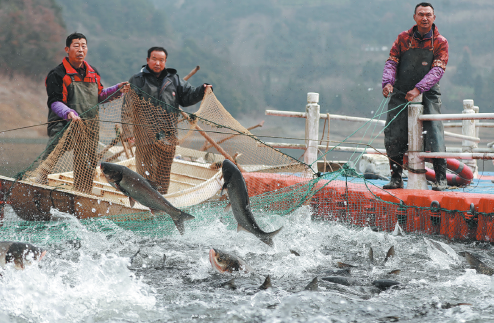Draft roots for eco-friendly aquaculture practices

A draft revision to China's fisheries law has been submitted to the country's top legislature, aiming to balance the development of the aquaculture and fishing industries with the conservation of marine resources.
The draft, submitted Saturday to the 13th session of the Standing Committee of the 14th National People's Congress, emphasizes improving the quality and promoting green development in the sector.
Initially enacted in 1986, the fisheries law has been credited with protecting fishery resources and safeguarding the rights of farmers. However, updates are needed to address the evolving needs of the industry, said Wang Xiang, spokesperson for the Legislative Affairs Commission of the NPC Standing Committee.
The revised draft consists of seven chapters and 88 articles, focusing on aquaculture, fishing regulations, resource conservation and oversight measures, according to Agriculture and Rural Affairs Minister Han Jun.
The draft proposes enhanced support for environmentally friendly aquaculture practices, including ecological farming and protections for aquaculture zones and tidal flats. It mandates compensation for farmers whose aquaculture licenses are reclaimed early for public interest projects.
Stricter safety measures for feed and medications used in aquaculture are also included. Fishing capacity and methods would be subject to tighter controls, aligning catch volumes with resource availability, while fishing vessels would be barred from operating beyond certified navigation areas.
Illegal fishing cases handled by agriculture authorities dropped 42 percent in the first three quarters of the year, according to ministry data. Public security officials arrested 8,579 suspects in organized illegal fishing cases during the same period, marking a 38 percent year-on-year increase.
The draft outlines stronger protections for key fishing waters and proposes establishing a national aquatic germplasm resource bank and a catalog of protected species. It also calls for stricter oversight of aquatic resource imports and exports, alongside tougher enforcement of seasonal and regional fishing bans.
China recently completed its first nationwide survey of aquatic germplasm resources, identifying 857 distinct types, according to the Ministry of Agriculture and Rural Affairs' Bureau of Fisheries. These resources, rich in genetic diversity, provide critical material for breeding new aquatic species, the bureau said.
A new chapter on supervision and enforcement in the draft defines the responsibilities of fishery law enforcement and maritime police agencies. It also introduces measures for inspections, port management and credit record-keeping for fishery enterprises.

Today's Top News
- TikTok moves closer to its ban date in US
- RMB stability to be further prioritized
- Oceans becoming warmer in China and worldwide
- Beijing offers foreign travelers greater convenience
- Biden out of the picture in Middle East: China Daily editorial
- Biden out of the picture in Middle East: China Daily editorial






























